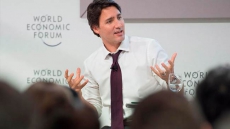TORONTO — There was a time, says Sandra Wallace, when taking her daughter Camryn for multiple appointments at Ottawa's children's hospital meant having to wait for her paper-based medical chart to follow her from one specialist clinic to another.
Camryn, who was born with Down syndrome, is seen about once a month at five different clinics at the Children's Hospital of Eastern Ontario, where doctors keep tabs on various aspects of the 10-year-old's health.
But with the introduction of electronic medical records, or EMRs, physicians in any of the clinics can now quickly access her pertinent information online, said Wallace.
"I used to try to keep a little book, but I don't need to do that anymore because everything is right there," she said of her daughter's electronic medical chart.
"We can pull up when she was last in any of the clinics, what tests she had, what the results were, what medications she's on or what her dosage is.
"Things go much faster and just seem to be a lot easier."
A report released Thursday by the Canadian Institute for Health Information (CIHI) shows an increasing proportion of the country's doctors are ditching paper files in favour of computer-based records.
In a survey of almost 2,300 Canadian family physicians, 73 per cent said they have gone to an EMR system in their offices, triple the 23 per cent who had adopted online charts in 2006.

EMR use varies significantly by province: Alberta topped the list, with 85 per cent of the surveyed family doctors employing EMRs, while the lowest adoption rate was in Newfoundland and Labrador, where 36 per cent said they store patient data electronically. In Ontario, 78 per cent of the family physicians said they've gone that route, joined by about 60 per cent of their Quebec colleagues.
Dr. Mary Pothos, a pediatrician who oversees the care of Camryn and other Down syndrome patients, said CHEO's electronic record system, called Epic, allows her to keep on top of all of the children's related health conditions treated by other specialists.
"A benefit for me as a clinician is that I feel I have all the information about my patients just a click away," she said from Ottawa. "So I could look at their lab results, I could look at tests being done with diagnostic imaging, as well as at their future appointments.
"So when I see a patient like Camryn in my office who's seen the ENT (ear, nose, and throat) doctor, the audiologist, the respirologist, the cardiologist ... I can click up all those reports and verify that the parents have an accurate understanding of what's going on."
Despite the benefits of going digital, Canada lags behind other developed countries in EMR adoption.
A 10-nation comparison of EMR use by the U.S.-based Commonwealth Fund, which partnered with CIHI to collect the Canadian survey data, shows that on average, 88 per cent of family doctors in the other countries have traded paper for pixels in their practices.
"What we see so far is that compared to other countries, Canadian family doctors who actually have an EMR are still just trying to realize some of the benefits," said Kathleen Morris, CIHI's vice-president of research and analysis.
Such benefits would include using their systems to review which of their diabetic patients need tests; how many of those 50 and older should be having screening for colorectal cancer; and which of their pediatric patients are due for vaccinations, Morris said.
"That's really where you get the true value of having the electronic medical records," she said. "I think what we're seeing from some of these (survey) results is that the real promise of electronic medical records is using them to improve care."
That's the goal of Canada Health Infoway, a federally funded body created 11 years ago to help the provinces and territories implement innovative digital technologies to improve the health of Canadians while reducing costs.
To date, Infoway has invested more than $2 billion towards the digital makeover of health systems across the country.
Infoway CEO Michael Green said now that Canadian hospitals and physicians are well on their way, the next step is to advance the systems to streamline services for patients.
In a few provinces, programs allow patients to access test results online through secure platforms. In Ontario, for instance, LifeLabs provides patients with an individual code so readings from blood tests can be called up online, instead of waiting for an appointment with the doctor to hear the results.
But there are many other aspects of care that surveys have shown are on patients' wish lists.
"We've done a lot of research and the core areas are appointment booking, getting referrals to specialists, getting prescription renewals," said Green.
"These are focused areas that patients have (interest in) — the ability to do e-referrals, to send the doctor an email, even perhaps having a video referral, rather than having to go to the doctor's office every time."



